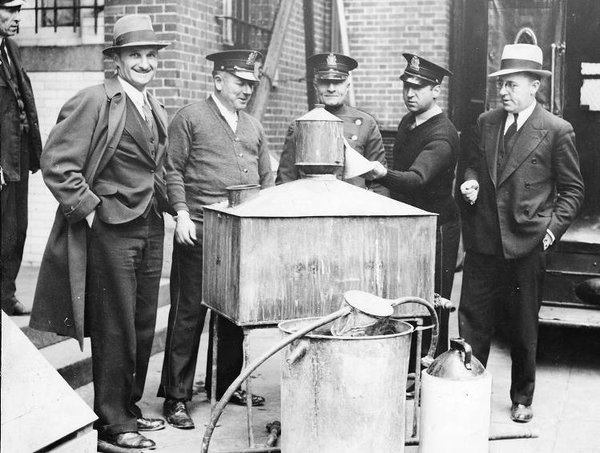Just two weeks before Prohibition took effect in the United States, the Mummers staged a funeral for "King Alcohol" in Philadelphia.
Floats that glided along Broad Street on Jan. 1, 1920 showed a smiling skeleton rising from the grave, with a mourner begging him to wake up, and a coffin for "John Barleycorn" decorated with clattering whiskey bottles. A "sad-looking musician" plucked out a funeral march on a piano, the Evening Public Ledger reported.
MORE: Museums and cultural institutions are offering discounts on tickets and memberships during winter
If these comic sketches suggested that Philly was welcoming the nationwide ban of liquor with good humor, law enforcement was in for a rude awakening. The city soon developed a reputation for flagrantly flouting the 18th Amendment. It got so bad that the federal government brought in a Marine to fix the problem — and Philadelphia sent him running back to the barracks.
Prohibition took effect at midnight on Jan. 17, 1920, prohibiting the manufacture, sale and transportation of any "intoxicating" beverage — booze with an ABV of at least 0.5%. Under these stipulations, bars had to remove their signs and pivot to the sale of soft drinks, which many did, at least on the surface. But speakeasies and bootlegging operations proliferated in major American cities, particularly Philadelphia.
As early as June 1920, a state senator was calling for a grand jury investigation into the spread of speakeasies in the 4th Ward. The police, however, were notoriously reluctant to crack down. A humor column that ran in the Inquirer in September 1920 advised bar owners "on days of raids very little hootch should be left around the premises ... otherwise our inspectors might be forced to press for a conviction." In case readers didn't catch the joke that the police were dirty, the piece also offered this tip:
"No payments by check," it read. "We gotta be careful."
Lax law enforcement allowed local gangsters and crime families to thrive. The Lanzetti brothers patched together an "alky cooking" network in row homes in South Philadelphia; they gave the owners stills, corn sugar and a cut, then sold the liquor at a much higher price. Max "Boo Boo" Hoff, meanwhile, ran his operation out of the Franklin Mortgage and Investment Co., bribing Reading Railroad employees to ship his product to Chicago and Minneapolis. The unmarked bar of the same name at 112 S. 18th St. features him in a mural.
The not-so-underground operations attracted national attention. In 1923, the Literary Digest ran a sensational feature on lawlessness in Pennsylvania — a "bootleggers' Elysium" — that singled out Philadelphia as the state's worst offender. Police records indicated there were at least 8,000 illegal bars in operation, and those were just the ones they knew about. Local bootleggers disguised their shipments as hair oil, perfume and varnish, but bartenders openly mixed drinks in front of customers, unconcerned who might see. A visiting reporter from the New York Herald Tribune declared, "If Philadelphia is not at this moment actually submerged by a liquor deluge, the engulfing torrent, from all appearances, must be pressing the Quaker city hard."
Philly's new mayor, W. Freeland Kendrick, turned to the U.S. Marines for help in 1924. The city tapped Gen. Smedley Butler, a West Chester native who had fought in the Spanish-American War and Boxer Rebellion, to serve as the director of public safety. He immediately executed surprise raids across town, claiming to shutter 973 saloons in a single 48-hour blitz. Butler also implemented sweeping police reforms, suspending incompetent or corrupt lieutenants and sending officers with desk jobs out into the streets. The city's firefighters became auxiliary police, trained and armed appropriately.
Kendrick asked the president to extend Butler's one-year leave of absence from the Marines by another three so he could continue his crackdown. But Calvin Coolidge only gave him one more, which turned out to be plenty for Butler. As the general's time in Philly wore on, he found that juries were increasingly reluctant to punish bootleggers and speakeasy owners. By 1925, less than 4% of the 10,381 people arrested for operating speakeasies received anything harsher than a small fine. Fed up with the lack of consequences and internal political strife, Butler blasted the city as a "cesspool" before he left for San Diego.
The situation had hardly improved three years later, when a series of gangland murders prompted a grand jury investigation into the illegal liquor trade in Philadelphia. The subsequent report found that corrupt Philadelphia police officers were earning roughly $2 million from the operation, and that 138 were "unfit for service." (When pressed at trial, some of the cops said they earned the money through gambling, dog breeding, inheritance, investments in haberdasheries and "building bird cages for the retail trade.") A captain and former state representative were indicted as a result, but key figures like Hoff were not. The gangster and others continued to work through the end of Prohibition in 1933.
By that point, it had long been clear that the 18th Amendment was unpopular. It was also depriving the cash-strapped nation, then in the throes of the Great Depression, of an easy, legal revenue stream. The national ban was lifted on Dec. 5 with the ratification of the 21st Amendment, the only constitutional amendment to repeal a previous one. The Mummers once again marked the occasion the following January with a funeral procession for John Barleycorn — but this time, he rose from his coffin.
Follow Kristin & PhillyVoice on Twitter: @kristin_hunt
| @thePhillyVoice
Like us on Facebook: PhillyVoice
Have a news tip? Let us know.

